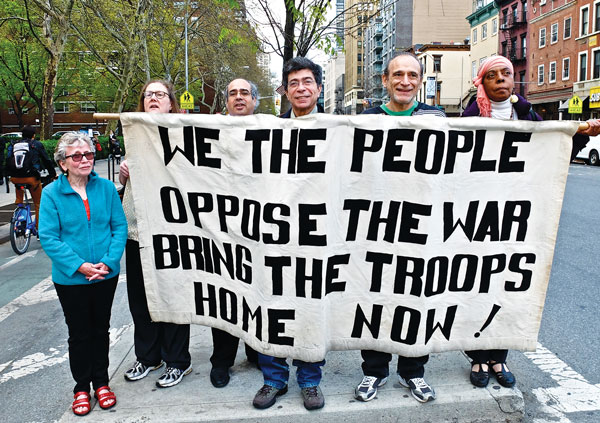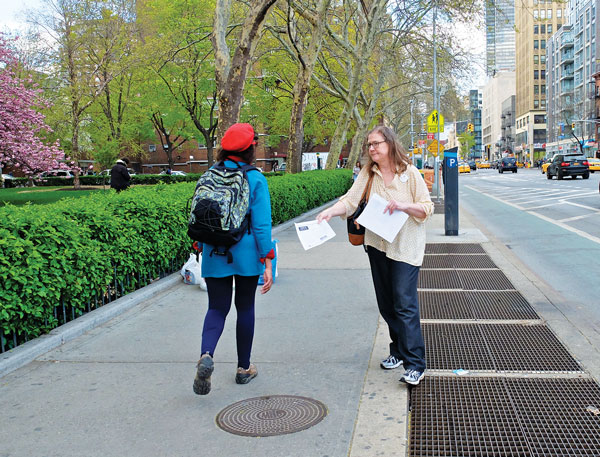
BY WINNIE McCROY | When the U.S. invaded Iraq, a group of concerned Chelsea residents gathered at the corner of Eighth Ave. and W. 24th St. to protest the military action. Ten years later, Chelsea Neighbors United to End the War continues their weekly protest. Known as Chelsea Stands Up Against the War, it takes place every Tues. from 6–7 p.m. as the group holds banners, hands out newsletters and tells passers-by why war is ruining our country.
“After the invasion of Iraq, a few of us said, ‘This is awful, we need to do something to speak out,’ ” recalled longtime member Bob Martin. “We got together for coffee at Paradise, and that’s when the idea of our weekly ‘stand-up’ started.”
Martin has been a stalwart member of the peace movement, Xeroxing weekly newsletters and attending when he is able — often with his wife, Kate Abel. Martin pointed to longtime member Roberto Rodriguez as an unflagging member, saying that they shared similar views about war as a tool of exploitation.
Growing up in Honduras, which he called “the original banana republic,” Rodriguez was familiar with the exploitation of the lower classes, often paid only 50 cents a day to carry towering bunches of bananas. Rodriguez sees similarities, saying that these war efforts don’t serve the common people, but rather put money in the pockets of those who benefit from conflicts: those who own munitions, oil and other tools of war.
“Protesting is important because in my point of view, wars are not justified,” Rodriguez told Chelsea Now. “A large part of the public believes that people outside of the U.S. are their enemies, which they’re not, really. The U.S. has a history of supporting regimes that benefit whatever they want to exploit. We are actually creating the enemies that we are fighting.”
Although he doesn’t justify the behaviors of those who retaliate against the U.S., Rodriguez said fighting back was an “understandable human reaction” to having their countries occupied by foreign invaders, their villages bombed, their neighbors attacked by drones, and their children starved.
“If we are doing so because of the thousands killed during 9/11, we’re out to exact the price of hundreds of thousands of lives,” said Rodriguez. “Your children and grandchildren will have to face the results.”
This “artificial menace” that leaders create has allowed terror to eradicate Constitutional rights, and Homeland Security and the Patriot Act have nullified many resources U.S. citizens can use to protect themselves from authoritative oppressive practices. Participating in this weekly protest lets Rodriguez express his voice that the funds used for war would be better spent on education, healthcare and infrastructure.
The recent front page article in The New York Times in which President Obama apologized for the death of two civilians in a drone strike perfectly summarizes Anne Finkelstein’s reason for participating in the protest. Although she doesn’t make it to many protests anymore, this longtime graphic designer updates their weekly newsletter.
“A lot of people consider the war over, but every week something new comes to light — for example, the news last week about the drone strikes,” said Finkelstein. “Every week, this group finds something to say about what’s going on that most people don’t know about.”
Finkelstein pointed to founding member Chuck Zlatkin as someone that has been with the event since the beginning, and maintains his commitment, despite having since relocated to Washington, DC.
“The first week in May marks 10 years, and we haven’t missed a week,” said Zlatkin. “Some people initially understood why we were out there in the beginning, and some were hostile to us. In time, people have seen that we serve as a beacon for them. We can’t force anyone to change, but we can be there and available for people to discuss the issues. They respect us for being out there and persistent, and over time they examine their own attitudes about the war.”
Among those who stop by are young people who are deployed to Iraq or Afghanistan, and those who return from tours of duty; relatives of soldiers, visitors from other countries — and their neighbors, who are glad that the group has not given up.
“A lot of people share these concerns, but there aren’t a lot that have the level of commitment to stand on the street in all kinds of weather,” said Finklestein, noting that the group was even out during Hurricane Sandy. “I think it’s extremely important that they continue, because although the situation changes, the basic underlying point remains, which is that our tax money is being used to kill people without our explicitly agreeing to it.”
When the group began the protest, numbers were greater, but as years passed, fewer people attended — sometimes 20, sometimes just two. But hostility toward protestors has declined, said Zlatkin, with more people stopping by to ask them about the issues. Having a weekly newsletter, which lists the numbers killed and injured from fighting, American dollars spent, plus a new article tackling different issues around the war, has helped the group be “accountable and transparent,” as Zlatkin said.
“For each of us, there is a different reason to why we keep coming back,” said Zlatkin. “Maybe in this instant society, to be committed to something that takes a long period of time is a reward in itself.”
“For me, it’s the ongoing struggle to get people to see the connections that drive the economic machinery in this world, the connections between that and war,” said Rodriguez. “I’m not a saint or a martyr, I’m just a human being doing what he can to make a change.”

A protester hands out the group’s weekly newsletter.
Their goal, said Martin, is to add their local voice to the continuing picture that our leaders aren’t getting right, saying that these conflicts were just part of the continuing stream of messes that the military gets into. Martin stressed that he did not place any fault on those serving in the military.
“At this point it’s a question of people being engaged and involved in what impacts us, and not giving up and feeling their voice is meaningless,” said Zlatkin. “Citizen action is what this nation is about, and what’s done in our name affects what we do. You can stand with us, with something else, but if you don’t take a stand, then you are letting people make decisions about your lives that are not connected at all with you and your community.”
Join Chelsea Stands Up Against the War every Tuesday from 6–7 p.m. at the corner of Eighth Ave. and W. 24th St.

































